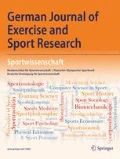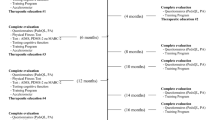Abstract
Most childhood cancer survivors are insufficiently active. Researchers are focusing on strategies to increase physical activity (PA). However, a detailed understanding of participation in specific types of PA is missing, meaning current strategies may lack relevant information. Thus, our study sought to analyze participation in different types of PA commonly engaged in by children: organized sports, physical education in school (PES), therapeutic exercise, and non-organized leisure-time PA. Thirty-eight childhood cancer outpatients and 51 healthy children completed questionnaires. Compared to healthy children, childhood cancer outpatients, especially those who are shortly after cessation of inpatient treatment, participated significantly less often in organized sports and PES and significantly more often in therapeutic exercise compared to the healthy children. Considering organized sports and PES afford children unique social benefits and provide the potential to motivate lifelong activity, future efforts should be placed on ensuring children with cancer can access these types of PA. Educating parents, teachers, and coaches, exploring referral pathways to exercise professionals and providing individual support may enhance participation rates in organized PA and should be investigated.
Zusammenfassung
Kinder und Jugendliche sind nach überstandener Krebserkrankung häufig inaktiv. Die Forschung konzentriert sich auf Strategien zur Erhöhung der körperlichen Aktivität (KA). Doch die Teilnahme an spezifischen Formen von KA ist wenig erforscht, sodass relevante Informationen zur Etablierung erfolgreicher Strategien fehlen. Aus diesem Grund wird in unserer Studie die Teilnahme an altersentsprechenden KA-Formen wie dem organisierten Sport, Schulsport, Bewegungstherapie und nicht-organisiertem Freizeitsport analysiert. 38 Kinder und Jugendliche, die die stationäre onkologische Therapie beendet haben sowie 51 gesunde Kinder und Jugendliche beantworteten Fragebögen. Verglichen mit gesunden Kindern beteiligten sich Kinder und Jugendliche nach onkologischer Akuttherapie signifikant seltener an organisiertem Sport und Schulsport und signifikant häufiger an bewegungstherapeutischen Angeboten – insbesondere wenn die stationäre Behandlung erst kürzlich beendet worden war. Angesichts der besonderen sozialen Vorteile von organisiertem Sport und Schulsport sowie deren Potential, einen langfristig aktiven Lebensstil anzubahnen sollten Initiativen ergriffen werden, um krebskranken Kindern und Jugendlichen die Teilnahme an diesen KA-Formen zu ermöglichen. Die Schulung von Eltern, Lehrern und Trainern, die Entwicklung von Zuweisungspfaden zu Bewegungsexperten sowie die Etablierung von individuellen Beratungs- und Unterstützungsangeboten können die Teilnahme an organisierter KA erhöhen und sollten wissenschaftlich überprüft werden.

Similar content being viewed by others
References
Arroyave, W. D., Clipp, E. C., Miller, P. E., Jones, L. W., Ward, D. S., Bonner, M. J., et al. (2008). Childhood cancer survivors’ perceived barriers to improving exercise and dietary behaviors. Oncology Nursing Forum, 35(1), 121–130. https://doi.org/10.1188/08.ONF.121-130.
Bailey, R. (2006). Physical education and sport in schools: a review of benefits and outcomes. Journal of School Health, 76(8), 397–401. https://doi.org/10.1111/j.1746-1561.2006.00132.x.
Baumann, F. T., Bloch, W., & Beulertz, J. (2013). Clinical exercise interventions in pediatric oncology—a systematic review. Pediatric Research, 74(4), 366–374. https://doi.org/10.1038/pr.2013.123.
Belanger, L. J., Plotnikoff, R. C., Clark, A. M., & Courneya, K. S. (2013). Prevalence, correlates, and psychosocial outcomes of sport participation in young adult cancer survivors. Psychology of Sport and Exercise, 14(2013), 298–304. https://doi.org/10.1016/j.psychsport.2012.10.010.
Eime, R. M., Young, J. A., Harvey, J. T., Charity, M. J., & Payne, W. R. (2013). A systematic review of the psychological and social benefits of participation in sports for children and adolescents: informing development of a conceptual model of health through sport. International Journal of Behavioral Nutrition and Physical Activity, 10, 98. https://doi.org/10.1186/1479-5868-10-98.
Florin, T. A., Fryer, E., Miyoshi, T., Weitzman, M., Mertens, A. C., Hudson, M. M., Sklar, C. A., et al. (2007). Physical inactivity in adult survivors of childhood acute Lymphoblastic leukemia: a report from the childhood cancer survivor study. Cancer Epidemiology, Biomarkers & Prevention, 16, 1356–1363. https://doi.org/10.1158/1055-9965.EPI-07-0048.
Götte, M., Taraks, S., & Boos, J. (2014a). Sports in pediatric oncology: the role(s) of physical activity for children with cancer. Journal of Pediatric Hematology/Oncology, 36(2), 85–90. https://doi.org/10.1097/MPH.0000000000000101.
Götte, M., Kesting, S., Winter, C., Rosenbaum, D., & Boos, J. (2014b). Comparison of self-reported physical activity in children and adolescents before and during cancer treatment. Pediatric Blood and Cancer, 61(6), 1023–1028. https://doi.org/10.1002/pbc.24898.
Huang, T., & Ness, K. K. (2011). Exercise interventions in children with cancer: a review. International Journal of Pediatrics. https://doi.org/10.1155/2011/461512.
Keats, M. R., Courneya, K. S., Danielsen, S., & Whitsett, S. F. (1999). Leisure-time physical activity and psychosocial well-being in adolescents after cancer diagnosis. Journal of Pediatric Oncology Nursing, 16(4), 180–188. https://doi.org/10.1177/104345429901600402.
Keats, M. R., Culos-Reed, S. N., Courneya, K. S., & McBride, M. (2006). An examination of physical activity behaviors in a sample of adolescent cancer survivors. Journal of Pediatric Oncology Nursing, 23(3), 135–142. https://doi.org/10.1177/1043454206287304.
Keats, M. R., Culos-Reed, N., & Courneya, K. S. (2007). An examination of the beliefs, attitudes and counselling practices of paediatric oncologists toward physical activity: a provincial survey. Paediatric and Child Health, 12(4), 289–293.
Kelly, A. K. (2011). Physical activity prescription for childhood cancer survivors. Current Sports Medicine Reports, 10(6), 352–359. https://doi.org/10.1249/JSR.0b013e318237be40.
Kesting, S. V., Götte, M., Seidel, C. C., Rosenbaum, D., & Boos, J. (2016). One in four questioned children faces problems regarding reintegration into physical education at school after treatment for pediatric cancer. Pediatric Blood and Cancer, 63(4), 737–739. https://doi.org/10.1002/pbc.25852.
Lampert, T., Mensink, G. B. M., Romahn, N., & Woll, A. (2007). Körperlich-sportliche Aktivität von Kindern und Jugendlichen in Deutschland. Ergebnisse des Kinder- und Jugendgesundheitssurveys (KiGGS). Bundesgesundheitsblatt, 50, 634–642. https://doi.org/10.1007/s00103-007-0224-8.
Ministerium für Schule und Weiterbildung des Landes Nordrhein-Westfalen [Ministry of School and Education] (2014). Rahmenvorgaben für den Schulsport in Nordrhein-Westfalen. https://www.schulentwicklung.nrw.de/lehrplaene/upload/klp_SI/HS/sp/Rahmenvorgaben_Schulsport_Endfassung.pdf. Accessed: 14 Dec 2017
Murnane, A., Gough, K., Thompson, K., Holland, L., & Conyers, R. (2015). Adolescents and young adult cancer survivors: exercise habits, quality of life and physical activity preferences. Supportive Care in Cancer, 23(2), 501–510. https://doi.org/10.1007/s00520-014-2446-2.
Ness, K. K., Leisenring, W. M., Huang, S., Hudson, M. M., Gurney, J. G., Whelan, K., et al. (2009). Predictors of inactive lifestyle among adult survivors of childhood cancer. Cancer, 115(9), 1984–1994. https://doi.org/10.1002/cncr.24209.
Opper, E., Worth, A., Wagner, M., & Boos, K. (2007). Motorik-Modul (MoMo) im Rahmen des Kinder- und Jugendgesundheitssurveys (KiGGS). Bundesgesundheitsblatt, 50, 879–888. https://doi.org/10.1007/s00103-007-0251-5.
Ross, W. L., Le, A., Zheng, D. J., Mitchell, H. R., Rotatori, J., Li, F., et al. (2018). Physical activity barriers, preferences, and beliefs in childhood cancer patients. Supportive Care in Cancer. https://doi.org/10.1007/s00520-017-4041-9.
Rourke, M. T., & Kazak, A. E. (2005). Psychological aspects of long-term survivorship. In C. L. Schwartz, W. L. Hobbie, L. S. Constine & K. S. Ruccione (Eds.), Pediatric oncology (pp. 295–204). Berlin, Heidelberg: Springer.
Rueegg, C. S., Gianinazzi, M. E., Michel, G., von der Weid, N. X., Bergstraesser, E., & Kuehni, C. E. (2013). Do Childhood Cancer Survivors with physical performance limitations reach healthy activity levels? Pediatric Blood and Cancer, 60(10), 1714–1720. https://doi.org/10.1002/pbc.24595.
Rueegg, C. S., von der Weid, N. X., Rebholz, C. E., Michel, G., Zwahlen, M., Grotzer, M., Kuehni, C. E., for the Swiss Paediatric Oncology Group (SPOG) (2012). Daily physical activities and sports in adult survivors of childhood cancer and healthy controls: a population-based questionnaire survey. PloS One, 7(4), e34930. https://doi.org/10.1371/journal.pone.0034930.
San Juan, A. F., Woolin, K., & Lucia, A. (2011). Physical activity and pediatric cancer survivorship. Recent Results in Cancer Research, 186, 319–347. https://doi.org/10.1007/978-3-642-04231-7_14.
Schultz, K. A. P., Ness, K. K., Whitton, J., Recklitis, C., Zebrack, B., Robison, L. L., et al. (2007). Behavioral and social outcomes in adolescent survivors of childhood cancer: a report from the childhood cancer survivor study. Journal of Clinical Oncology, 25(4), 3649–3656. https://doi.org/10.1200/JCO.2006.09.2486.
Strong, W. B., Malina, R. M., Blimkie, C. J. R., Daniels, S. R., Dishman, R. K., Gutin, B., et al. (2005). Evidence based physical activity for school-age youth. The Journal of Pediatrics, 146(6), 732–737. https://doi.org/10.1016/j.jpeds.2005.01.055.
Winter, C., Müller, C., Hoffmann, C., Boos, J., & Rosenbaum, D. (2010). Physical activity and childhood cancer. Pediatric Blood and Cancer, 54(4), 501–510. https://doi.org/10.1002/pbc.22271.
World Health Organization (2017a). Physical activity. http://www.who.int/mediacentre/factsheets/fs385/en/. Accessed: 14 March 2018
World Health Organization (2017b). Global strategy on diet, physical activity and health. What is moderate-intensity and vigorous-intensity physical activity. http://www.who.int/dietphysicalactivity/physical_activity_intensity/en/. Accessed: 14 March 2018
Wright, M. (2015). Physical activity participation and preferences: developmental and oncology-related transitions in adolescents treated for cancer. Physiotherapy Canada, 67(3), 292–299. https://doi.org/10.3138/ptc.2014-25LHC.
Wright, M., Bryans, A., Gray, K., Skinner, L., & Verhoeve, A. (2013). Physical activity in adolescents following treatment for cancer: influencing factors. Leukemia Research and Treatment, 2013, 592395. https://doi.org/10.1155/2013/592395.
Zebrack, B. (2009). Information and service needs for yound adult cancer survivors. Supportive Care in Cancer, 17(4), 349–357. https://doi.org/10.1007/s00520-008-0469-2.
Acknowledgements
The authors would like to thank all participants and their families for participation in this study. We would like to acknowledge Amanda Wurz for her review and edits on the final manuscript and Alexander Schenk for designing the figure. We thank Regine Söntgerath for her support in conducting the study at the University Clinic of Leipzig, Department of Pediatric Oncology, Hematology and Hemostaseology, J. Faber and Marie A. Neu for recruiting patients and conducting this study at the University Medical Center Mainz and A. Prokop for his support in recruiting patients at the outpatient clinic for pediatric hematology/oncology, Clinic for Children and Youth Medicine, Children’s Hospital Amsterdamer Straße in Cologne.
Funding
This study was funded by the German Sports University (Cologne) and I. Laukin-Kleiner (Leipzig).
Author information
Authors and Affiliations
Corresponding author
Ethics declarations
Conflict of interest
J. Daeggelmann, V. Rustler, K. Eckert, V. Kramp, S. Stoessel, W. Bloch and F.T. Baumann declare that they have no competing interests.
Ethics approval was obtained for all study sites and the study was carried out in accordance with the Declaration of Helsinki. Informed consent was obtained from all individual participants included in the study. In the case of underage patients, consent was obtained from a parent or legal guardian.
Rights and permissions
About this article
Cite this article
Daeggelmann, J., Rustler, V., Eckert, K. et al. Participation in organized sports, physical education, therapeutic exercises, and non-organized leisure-time physical activity: how does participation differ between childhood cancer outpatients and healthy peers?. Ger J Exerc Sport Res 48, 387–394 (2018). https://doi.org/10.1007/s12662-018-0501-8
Received:
Accepted:
Published:
Issue Date:
DOI: https://doi.org/10.1007/s12662-018-0501-8




